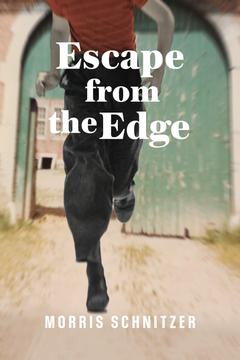Escape from the Edge
Crossing Over
It took us about half a day to work our way agonizingly down the mountainside, through the trees and underbrush, to the Doubs River. As much as possible, we tried not to slide down, so as not to tear our pants or ruin our clothes.
We had found ourselves at a spot in the Jura Mountains where the Doubs River runs through a steep but narrow gorge. The rocky bluffs covered with tall trees dropped abruptly to the water, but in spots a fringe of beach emerged beside the water, which we had made our way down to. The channel of the river along this strip was not very wide, but the water was deep and swift. On one side was France; on the other, Switzerland.
So we had finally reached the riverside, and no patrols were about. We could cross, but the river was wild, and I couldn’t swim. Piefke jumped in and swam across. I thought maybe I would be able to swim, that maybe fear would force me to swim.
I jumped in the water, but I still couldn’t swim and almost drowned. Clutching at some reeds, I managed to keep myself afloat and pull myself out of the water.
I was still on the French side. Piefke was already on the other side and called out to me. I thought, Holy God, I’m going to be caught here. The patrols would be coming by soon; I could hear the police dogs barking.
I scurried around and saw a boat chained to a metal stake on the bank. Could I tear the chain free or pull the stake out of the ground? Could I tear the boat loose? I had no tools, no equipment. I tore at the chain and pulled and tugged. I kept on pulling, tearing, straining. Almost anything is possible in extreme situations. I tore the stake out of the ground.
The boat was loose, but there were no oars in it. I jumped in and paddled with my hands. It was very awkward, and I could scarcely control the boat.
By sheer luck, I manoeuvred the boat into the middle of the river. At that point I stood up and heaved myself out. In one leap, I almost reached the other side. I scrambled to my feet and waded the rest of the way.
I was on the Swiss side and began to climb the slope. I had completely lost sight of Piefke. It was growing dark, and there were dense woods by the riverside.
I had barely made it to the Swiss side before I heard German voices on the other. They were shouting that the boat was gone, their patrol boat was gone. They hollered, “Wo ist das Boot? Das Ruderboot ist verschwunden. Etwas stimmt nicht.” (Where’s the boat? The rowboat is loose. Something’s wrong.)
The dogs were barking fiercely — so fiercely, I thought they were going to cross the river. It was rumoured that German patrols sometimes crossed to the Swiss side to pick up whomever they were after, and that the Swiss weren’t guarding the border diligently. I didn’t see any Swiss guards at all, but the Germans didn’t come across.
In the morning, I met Piefke high up on the hill. When we reached the top together, we lay down in the sun to dry our clothes, which were still soaked through.
We hugged and congratulated each other on our accomplishment. “We’ve done it! We’re free! We’re in a free country. We’ve put those miseries behind us.”
We had succeeded beyond our wildest dreams. Together we had managed to enter Switzerland in late August 1942 without any money and without a guide. We had crossed three borders in about six weeks, a remarkable feat considering we had done everything more or less on our own.
Escape from the Edge, Morris Schnitzer
Narrow escapes and bold decisions define the life of teenager Morris Schnitzer. Fleeing from Nazi Germany before the onset of World War II, Morris ends up in the Netherlands only to watch the country be invaded by the Nazis. With his father’s warning to never set foot in a concentration camp echoing in his mind, Morris resolves to fight — and survive. As he assumes false identities and crosses endless borders in search of safety, Morris never acquiesces to the Nazi occupiers in Western Europe. In his epic journey to Escape from the Edge, Morris endures imprisonment and gruelling work as a farmhand, joins the resistance in Belgium and ultimately enlists in the American army, vowing to take revenge for all that he has lost.
Introduction by Bob Moore
- At a Glance
- Germany; the Netherlands; France; Belgium
- Kristallnacht
- Kindertransport
- Escape
- Passing/false identity
- Resistance
- Postwar Netherlands
- Arrived in Canada in 1947
- Audiobook available
- Educational materials available: Hearing History: A Holocaust Survivor Memoir Read Aloud
About the author

Morris Schnitzer (1922-2020) was born in Bochum, Germany. In 1947, he immigrated to Montreal, where he earned both a BSc and MSc at McGill University, going on to earn his PhD in 1955. In Ottawa, Morris worked at the Canadian government’s Department of Agriculture as a principal researcher in the chemistry of soil organic matter. He won the prestigious Wolf Prize in Agriculture in 1995 and wrote three books and more than four hundred scientific papers over the course of his distinguished career.
Free Books and Educational Materials
We help teachers bring the subject of the Holocaust into their classrooms, using first-person narratives as a way for students to connect with the history of the Holocaust through survivors’ experiences. Our Holocaust survivor memoirs, educational resources and programming are free of charge in Canada and available in both French and English.


